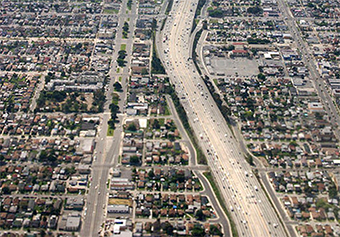
Is Big Brother Watching Your Car?
| published January 31, 2015 |
By Thursday Review staff
A program which has been in place for several years uses the nation’s vast network of traffic cameras and license plate readers to track the movements of millions of American drivers, according to a recent report from the American Civil Liberties Union.
The U.S. Justice Department—working with the NSA and the DEA—has been using the program largely in secret, and has so far collected an estimated 343 million individual records on vehicular movement. Traffic cameras, street surveillance cameras, security systems, and even state- and locally-managed license plate readers have become commonplace across the country, especially along busy interstate and U.S. highways, and along the congested and heavily-travelled urban corridor. Coupled with the traffic cameras and security systems in place around airports, train terminals, hotels and malls, and even car rental agencies, the Justice Department can track a significant number of cars and trucks, though analysts and civil libertarians can only estimate how many people this might affect nationwide.
In late January, the U.S. Justice Department revealed the extent of the program after the ACLU and other groups filed a Freedom of Information Act request. This week, both Republicans and Democrats on the Senate Judiciary Committee have pressed the Justice Department, and the other agencies involved, to provide clarification about how the program operates, and why it was deemed necessary to create real-time vehicular tracking tools for average Americans.
Originally used only along border areas and in the urban environs near border cities and towns as a way to track illegal immigration and provide interdiction in drug trafficking, the program was greatly expanded beyond the boundaries of that original mission. Some in the U.S. Senate want to understand how the program grew so quickly to include harvesting the collating the movements of average Americans. Republican Senator Charles Grassley of Iowa and Democratic Senator Patrick Leahy of Vermont say that such a sweeping, indiscriminate program of tracking raises serious concerns about privacy.
Also of deep concern is an overlapping program developed by the DEA (Drug Enforcement Agency) and the NSA in which low-flying small planes can be outfitted with relay devices which are similar to the receiver/transmitter/relay systems used on typical cell phone towers along interstate highways. The devices on the small planes can apparently pose as cell phone relay equipment, allowing government agents to harvest the data of cell phones, blackberries, iPads and other small devices in the cars and trucks below. When this data is combined with the license plate tracking tools, the resulting information can generate hyper-accurate analysis of the movements and intentions of the drivers and passengers below.
The Justice Department and the DEA, both of which have stated that the program is perfectly legal, say that they use the data collected with extreme care and precision, and have consistently denied that they construct massive files on the driving habits and movements of average Americans. But the disclosure this week of some details of the program suggest otherwise, and seem to indicate a widely-cast net which gathers and stores hundreds of thousands of pieces of driver information each week—all of it fed into a central database.
Civil libertarians are concerned that such an indiscriminate set of tools and technologies—and the development of vehicular files on all drivers—is a clear violation of the U.S. Constitution. Some also fear that the program (much like the NSA’s data harvesting program which came to light after it was disclosed by whistle-blower Edward Snowden) is a harbinger of a near-future in which citizens have demonstrably less privacy.
Senators are also concerned about some internal DEA correspondence which shows that one apparent intended use of the vehicle tracking was to enhance what is known as “asset forfeiture,” a highly controversial process by which random or circumstantial tracking reveals information useful to the DEA or the IRS in cash or property seizures against people not officially charged with a crime or for whom there was no probable cause for search—a clear violation, many legal scholars believe, of the Fourth Amendment. Though the Justice Department and the DEA say the tracking was not intended for such purposes, internal documents and emails indicate that there was bureaucratic support for precisely that kind of program.
The Justice Department, after initially denying that such a program even existed, now says that it generally only stores the data on vehicles for about three months. But lawmakers want more answers, and in their report said they will require more study to determine legality of such a program of auto and truck tracking.
“We appreciate that all of these new technologies are potentially useful law enforcement tools,” the Senators wrote in a statement, “[we] need a broader understanding of how these tools are being used, [and] how the data is being shared.”
Related Thursday Review articles:
The NSA’s Quiet Acknowledgement; Thursday Review editors; Thursday Review; January 7, 2015.
Reining-In the NSA, Sort Of; R. Alan Clanton; Thursday Review; January 17, 2014.
